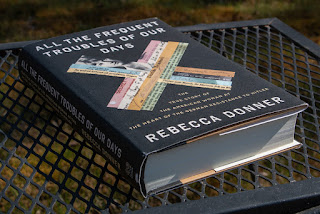I’ve just
finished All the Frequent Troubles of our Days, by Rebecca Donner. For
me 2022 has so far been a year of extremely good books, but this one left me in
awe. I’m not one for idle praise or liking a book only because I have a
connection to it or its author. Donner is a brilliant storyteller, and I was
pulled in from the first chapter. She ended the story with touching and poetic
words, and, not knowing it was over (there were 74 more pages!), when I turned the page and saw “Acknowledgements”
I actually shouted “No!” Although she ended the story beautifully, I was not
ready to stop reading. So for the first time in my life I read every one of her
acknowledgments and am now going through her end notes.
When I
taught high school German in Wisconsin, I alternated the curriculum each year
in my combined level 3 & 4 class. One topic was the resistance: one
year I taught “die Weiße Rose” (the short novel followed by the 1982
movie), and the next year I taught a unit focusing on the 2000 film “Bonhoeffer: Agent of Grace.” Since I was teaching at a Catholic school and we were expected
to begin class with a prayer or reflection, I was able to teach my students one
of Bonhoeffer’s prayers: “Gott, in mir ist es finster, aber bei dir ist das Licht.” In the film Bonhoeffer prays this prayer through the wall with the prisoner in
the cell next to his.
Many of the
names in Donner’s book are familiar to me. In fact, when my mom first told me
in autumn 2021 that there was a book out about Mildred Harnack, I knew her name
right away. Admittedly I was more familiar with her husband and brother-in-law
than with Mildred, as she only gets a brief mention – if that – in general
sources about the resistance.
Indeed,
while reading Donner’s biography about Mildred I found myself wondering many
times how it is that I’d never realized her importance in the story of the
Circle (known by many as “die Rote Kapelle”). How greatly this would
have enhanced my teaching of both stories – die Weiße Rose and
Bonhoeffer!
Mildred was
from Milwaukee, Wisconsin – 68 miles from the school where I was teaching.
Mildred was the only female U.S. citizen to be executed by the Nazis.
Mildred was the only U.S. citizen to be executed on direct orders of Hitler.
Those
points alone would have brought the stories closer to my students.
Now to the
book. Rebecca Donner used primary sources where she still could, having found
Don Heath Jr., Mildred Harnack’s young courier in Berlin, and speaking with her own
grandmother, Jane Donner Sweeny (nee Esch), Mildred’s niece. Additionally, as
she tells us in the Author’s Note, she used letters, postcards, memoirs,
diaries, and handwritten notes, along with secondary sources such as newspaper
articles, archived documents, and the first biography of Mildred Harnack.
The
twelve sections of the book follow the people and their stories chronologically, though there are
now and then helpful flashbacks or jumps forward that helped me keep track of
who everyone was and how they influenced or told about the events. The people
involved in the resistance came alive for me on the pages, as Donner described their personalities so vividly. I can only imagine daring what they did under the
watchful eye of such a brutally sadistic regime.
We think
such a thing as Hitler and his Nazis could never be in power again, and if so
we (the western world) would handle things differently. But then I read about
how many Germans were unconcerned in the early days of Hitler because he was
just eccentric and claimed Germany wanted peace, and later how the western world tried to deal with him first with
diplomacy and appeasement. If he gets the Sudetenland, maybe he’ll be satisfied
and quit. That rings too many bells at this point, considering Crimea, Ukraine
and Putin.
I can recommend this book to anyone interested in WWII history,
especially in the resistance movements. Also to anyone wanting to read about
women who faced great risks to fight for a better world. I believe those who
know the stories of the two most well-known resistance groups better than I do
will be intrigued by the connections between them and the names they’ll
recognize:
- Mildred and Arvid Harnack
- Falk Harnack
- Dietrich Bonhoeffer*
- Klaus Bonhoeffer
- Hans von Dohnányi** (married to Bonhoeffer’s
sister)
- Admiral Wilhelm Canaris
- Hans and Sophie Scholl (siblings involved with die Weiße Rose)
*Well-known German actor Ulrich Tukur acted in both "die Weiße Rose" as Willi Graf, friend of the Scholls and resistance fighter, and 18 years later as Dietrich Bonhoeffer in "Bonhoeffer: Agent of Grace."
**Justus von Dohnányi, the grandson of Hans, is an
actor and directer who acted in the film “Bonhoeffer: Agent of Grace.”
…as well as details from the resistance story Donner also tells about in her book:
- Falk Harnack meets with Hans Scholl in November 1942 about distributing leaflets and connecting the resistance groups (depicted in “die Weiße Rose”)
- Bonhoeffer secretly sent messages to his fiancé and family by marking one letter every 10 pages in books (backwards) that prison guards allowed visitors to bring to him
- Bonhoeffer
and von Dohnányi were involved in the “Valkyrie
plot” to kill Hitler, which failed and led to their arrests
- Bonhoeffer, as a Lutheran minister, had conflicting thoughts about being involved in the plot to murder a person even as despicable as Hitler
- Prisoners held in brick cells and carefully watched still found ways to communicate with each other
- forms of active and passive resistance
…and the places that Donner mentions:
- University of Wisconsin, Madison and State Street
- Wannsee, near Berlin
- the KaDeWe (Kaufhaus des Westens, largest department store in Europe)
- Milwaukee, Wisconsin
- Alexanderplatz, Berlin
- the Black Forest, where Mildred and Arvid take a hiking vacation to rejuvenate
- UW-Madison, Sterling and Bascom Halls: Arvid and Mildred met because Arvid mixed up the two neighboring lecture halls
 |
| Bascom Hall? Or Sterling Hall? Madison, Wisconsin |
The familiarity of these names, events and places drew me in, but it was the details I did not previously know that made this book special for me. A book only gets a top rating from me when it makes me think more deeply about something or when I learn something valuable from it. And I certainly learned a lot from this book about Mildred’s life, the lives of those close to her and the resistance movement. It's also pretty impossible to read a book like this and not ask yourself what you would have done under those same circumstances.
 |
| Plötzensee Memorial, Berlin |
When I was on the student exchange in 1986, the coordinator of the exchange in Esslingen (now my Schwiegermutter/mother-in-law) took us to Berlin for 5 days. While there, we visited the site of the Berlin prison, Plötzensee. I took a few pictures of the site, as well as the large memorial urn that contains dirt from each of the concentration camps, but didn’t know much about the significance of it then. That is where Mildred and Arvid Harnack were executed.
 |
| Memorial urn at Plötzensee "Die Urne enthält Erde aus deutschen Konzentrationslagern" |
Lastly I will mention, though it is not important to Mildred’s story or Donner’s book, I share a family connection to Mildred and Rebecca if you dig through the family tree thoroughly enough to explore the Esch and Jung lines. Apparently Rebecca and I are 4th cousins, meaning we share an ancestor.
The book will be available in Germany in August 2022, and Rebecca Donner herself told me the German translation will be released in September 2022!Gott, zu dir rufe ich!
In mir ist es finster,
aber bei dir ist das Licht;
ich bin einsam,
aber du verlässt mich nicht;
ich bin kleinmütig,
aber bei dir ist die Hilfe;
ich bin unruhig,
aber bei dir ist der Friede;
in mir ist Bitterkeit,
aber bei dir ist die Geduld;
ich verstehe deine Wege nicht,
aber du weißt den Weg für mich.
~Dietrich Bonhoeffer






















